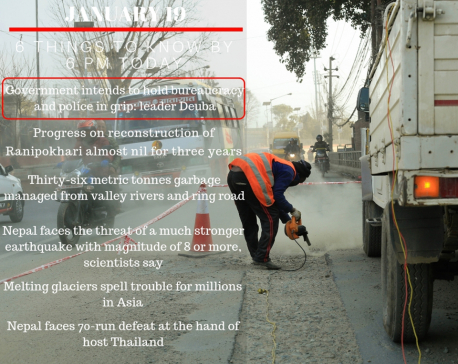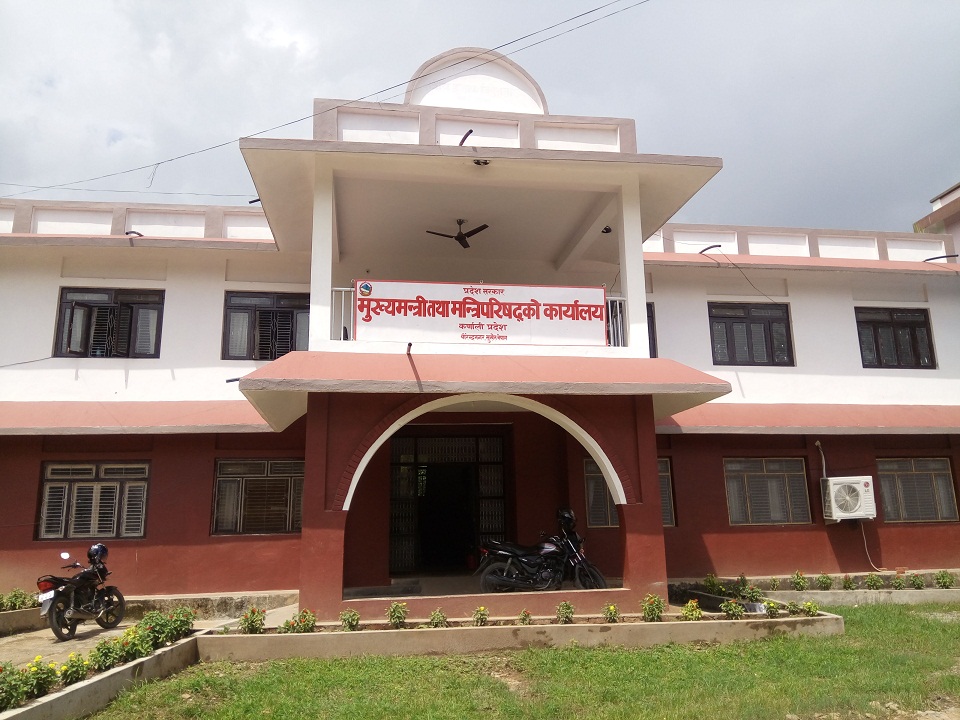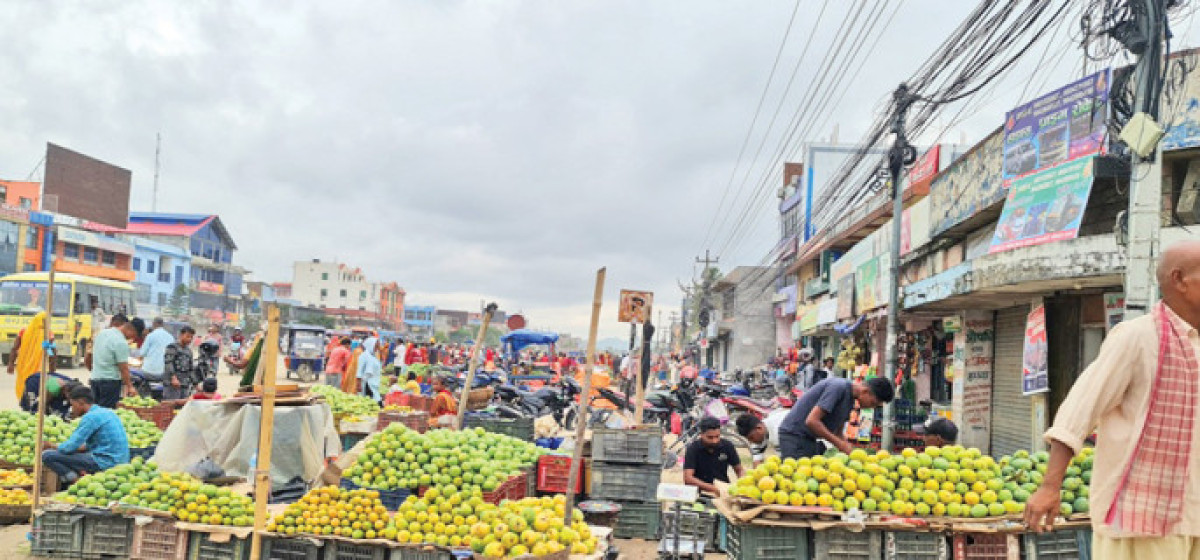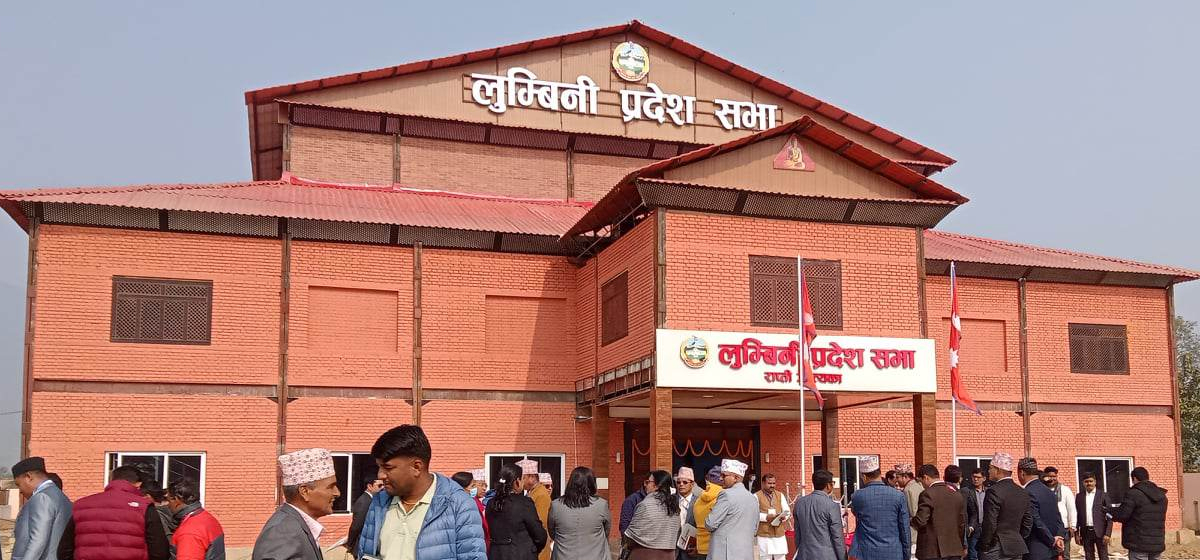
OR

The on-going political imbroglio has been created by the lack of trust and mutual doubt and suspicion amongst the four major players. As none of the four holds a simple majority, they have to join hands with the other to form the next coalition government.
It’s been nearly two months since the Supreme Court reinstated parliament. But the much-anticipated change in government has not happened and PM Oli continues to rule the roost. All previous predictions on a change in the government have failed. For example, Barsha Man Pun predicted that the KP Oli-led government would change by 5 Chaitra (March 18); Shekhar Koirala predicted this to happen within 10 days of the reinstatement of parliament; and even Bam Dev Gautam saying PM Oli will not see the sun rising from Baluwatar on Nepali New Year Day. Now, Comrade Prachanda is talking about a government change within the next few days or within a week. The opposition leaders are vehemently calling for the PM’s resignation on moral grounds, but the ground he is standing on is not shaking or sinking.
The tri-some equilibrium
Nepal’s politics is being played like a game of scissor, paper and stone or in an analogous situation of a snake, a frog and a scorpion. The snake can eat the frog, the frog can eat the scorpion and the scorpion cannot eat a snake but it can kill it with its deadly sting. When you put all three creatures together, you end up with a tri-some equilibrium situation, a situation of balancing of power – nobody takes the lead, as the fearful other is lurking behind. It is also a situation of impasse, as power balance rests on fear of extinction rather than a hope for survival. The current political imbroglio resembles this tri-some situation though we have four parties to the game, namely, UML, Nepali Congress, Maoist Centre and JSP.
The Seven Samurai
Going by social and some other on-line media, at least seven names have popped up as the possible candidates for the next prime minister of Nepal. Obviously, the first candidate is the incumbent Prime Minister KP Oli himself. Being the leader of the largest party in parliament and his obduracy to resign from power, many believe he will continue to remain, by hook or crook, as the PM of the country till the next general elections are held. To borrow his own words, “for the sake of stability and strength of the country”, he must remain as the PM of Nepal. In a way, he is a must be PM.
The second most likely candidate who has, so far, publicly shown little interest or reluctance to become the next PM, is SB Deuba, the president of Nepali Congress. Nepali Congress has officially stated that the party will not grease the palms of other political parties to get onto power but will not evade public responsibility either. Remember, Bishwa Prakash Sharma, the spokesperson of the party, saying, “Nepali Congress taking a look from the window”?
The third candidate is Prachanda himself. Comrade Prachanda is in an “avoid-approach” dilemma. He is scared of being accused as padlolup (power-hungry) especially by the Oli faction, and, at the same time, dreams of becoming the next PM. Therefore, for public consumption, he has already stated that he is “not interested in” or is “open to negotiation” and offered the PM’s seat to Nepali Congress or JSP in the next coalition government. There is more than enough news on the possibility of Deuba and Prachanda sharing the remaining two years on a turn by turn basis.
The fourth would be or could be PM is Mahant Thakur from JSP. Both Oli and Maoists are offering him the post of the PM. Though he has not publicly expressed his desire, given the fallibility of the Terai-Madhesi leaders craving for power, he simply cannot be ignored.
The fifth possible candidate is Dr Baburam Bhattari from JSP again. He is being projected, not because he is associated with JSP, a party having the magic number in parliament, but because he is a pet child of India and, moreover, his idea of forming a national government, to hold early elections, is not bad. In the present context, he could very much be an alternative to obdurate PM Oli. The sixth candidate is Ram Chandra Paudel from the Nepali Congress. His name is also floated as a possible next President. However, many take this as a ploy by Deuba to get rid of him from the chair of the party presidency.
The seventh candidate is Madhav Kumar Nepal. To save the unity of CPN (UML), there is or was news that PM Oli himself offered him to be the next PM.
Besides the above seven names, some other names that are being circulated around in social media include Bam Dev Gautam and Chief Justice Cholendra SJB Rana, with the possibility of the latter taking a similar role as played by CJ Khila Raj Regmi during the political imbroglio in 2013.
The Imbroglio
The on-going political imbroglio has been created by the lack of trust and mutual doubt and suspicion amongst the four major players. As none of the four holds a simple majority, they have to join hands with the other to form the next coalition government. The political permutations and combinations are still in a state of hazy situation – similar to the weather of the Kathmandu Valley. Like the Nepali Congress, we too have to “wait and see”.
Though the CPN-UML headed by PM Oli has a strategic advantage in forming the next government, simply because it can negotiate with any one of the remaining three players to form the next coalition government. The remaining three political parties have to have a three party coalition. As the CPN-UML is already in power and as long as the Maoist Centre does not withdraw their support, it will continue to remain in power. Once the Maoist Centre withdraws its support, the Oli government will have 30 days of breathing space to garner a vote of confidence in parliament. If it fails to garner the vote of confidence and, if the opposition fails to come up with an alternative, being the largest party, the CPN-UML enjoys the privilege to form the next government. If the largest-party government also fails to garner the vote of confidence in parliament, as per the constitution, it will move onto forming the next government by a charismatic leader. At the moment, either by design or default, Oli regards himself as the charismatic leader of this country. If the charismatic leader also fails to garner the vote of confidence, ultimately, we will be into a situation where parliament will be unable to elect the next PM. This will bring us back to square one, that is, PM Oli dissolving parliament and calling for next elections. However, the strategic advantage of PM Oli is countered by a strategic disadvantage – of possible defection by MPs loyal to the Nepal-Khanal faction.
The Nepali Congress is constantly in a tug of war between a coalition with CPN-UML faction of PM Oli or with the Maoist Centre and JSP, staying in the opposition or dirtying its hands for getting involved with communist disputes, focusing on short term or long term gains, party interests or personal interests. Nepali Congress President Deuba is in a kind of dilemma.
Amongst the four, probably the Maoist Centre is in the most difficult dilemma. The party is being accused of calling for the PM’s resignation on moral grounds and, at the same time, not withdrawing their support to PM Oli. There is also a need to topple the Oli government but, at the same time, preserve the interest of MK Nepal who has been forced to join CPN (UML) as a result of the Supreme Court annulling the unification between CPN-UML and CPN (Maoist Centre). The Maoists are having the most difficult situation of having to wage a war with Oli and, at the same time, earning and retaining the trust of most unreliable partners - Nepali Congress and JSP.
Finally, JSP, the smallest party amongst the four, is having the highest bargaining power due to its magic number. This does not mean it is in the most comfortable zone. There are discordant voices within JSP. First, the party has not been united; it is simply a makeshift arrangement between Janata Party and Samajwadi Party. The party can easily split into two. Second, there is a strong line of thinking that it should not use Resham Chaudhary as a bargaining chip to get onto power. Its senior leader Mahanta Thakur quips, “What is the point in having democracy if it forces people to go to jails?”
The final missing factor in this jigsaw puzzle is the Chindia or the joint effect of China and India perception toward Nepal. The Chinese ambassador may be busy making calls and visiting key political leaders, but as long as India keeps quiet, calling the matter to be “internal”, nothing can be expected to happen soon. A due apology for being a bit sarcastic.
You May Like This

Political Space for Youths
The political space for youths is going to contract further in South Asia including Nepal until and unless the senior... Read More...

Jan 19: 6 things to know by 6 PM today
Your daily dose of missed important news of the day. ... Read More...

Party president has become dictatorial: NC leader KC
RUPANDEHI, Nov 24: Nepali Congress central committee member Arjun Narsingh KC has accused the party leadership of functioning like a... Read More...

Just In
- Karnali CM Kandel secures vote of confidence
- National Youth Scientists Conference to be organized in Surkhet
- Rautahat traders call for extended night market hours amid summer heat
- Resignation of JSP minister rejected in Lumbini province
- Russia warns NATO nuclear facilities in Poland could become military target
- 16th Five Year Plan: Govt unveils 40 goals for prosperity (with full list)
- SC hearing on fake Bhutanese refugees case involving ex-deputy PM Rayamajhi today
- Clash erupts between police and agitating locals in Dhanusha, nine tear gas shells fired



















Leave A Comment